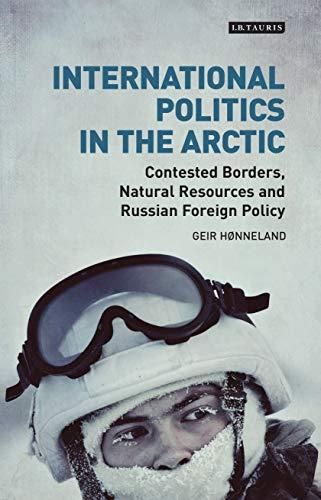Arctic expert Geir Hønneland offers a collection of essays detailing conflict, identity, and the likely future of Russia and the West in the Far North

Russia in the Arctic, and in the World
Building on years of research, political scientist Geir Hønneland presents a primer on Arctic issues and Russia’s geopolitical intentions that seems all the more relevant since the latter’s invasion of Ukraine. The wildly prolific Hønneland – whose specialties are Arctic international politics and Russia’s role in the area – offers a set of previously published articles on environmental protection, resource management, nuclear safety and ocean governance, all filtered through his expert knowledge of the Far North.
Though you might think Hønneland writes for a niche audience, you’d be mistaken: He provides an engrossing exploration of the Arctic’s future and, by extension, that of the planet. And no one, it seems, can match Hønneland’s expertise in the region.
Russia and the West
In 2009, Russia planted its flag at the North Pole. The West regarded this as an attempt to lay exclusive claim to the region’s untapped natural resources.
This book aims to show the Janus face of Russian foreign policy in relation to the Arctic as elsewhere.Geir Hønneland
States with lands adjacent to polar waters – Canada, the United States, Denmark, Greenland and Norway – enjoy strong mutual relationships and NATO membership. Russia remains a rogue player, though it often cooperates with international law. Hønneland explains that Russia usually suspects the West of bad intentions while grudgingly admiring it.
Russian History
Orthodox Christianity and the legacy of 13th and 14th century Mongol invasions influenced Russian identity. Russia’s pursuit of grand ambitions finds its root in the Orthodox culture’s embrace of the mystical and its rejection of the trivial. Hønneland finds that the dark side of Russia’s grandiosity is pride, misery, an inferiority complex and a refusal to learn from history.
The Soviet era marked a long period of isolation from Western knowledge and trade. Still, even before the Russian Revolution, Russians saw themselves as separate in identity and traditions from their Nordic trading partners – and vice versa.
After the dissolution of the Soviet Union in 1991, many Russians hoped that Western reforms would restore political stability and economic prosperity. But by the mid-1990s, they had come to believe that Western countries were seeking to humiliate Russia in a bid to shore up their own power.
Western motivations tend to be interpreted in the worst possible way.Geir Hønneland
Russia’s economic struggles since the 2000s have shaped its narratives, national priorities and international relations. Its fear that Canada and other NATO members want control of the Arctic stems, in part, from its strong belief that nations are in perpetual conflict over resources and that it is only rational for one state to damage another’s interests, even if doing so yields no immediate gain. NATO’s expansion and intervention in Kosovo did nothing to rid Russians of this impression.
Regions
In characterizing the Arctic, Hønneland details how shared geographic, geologic and climatic traits delineate “natural” regions. Economic or industrial activity define “economic” regions. Human occupants feel a distinct sense of “us” in “identity” regions, while “functional” regions facilitate engagement across borders.
It is only by telling stories about who we are that it becomes possible to say what we want.Geir Hønneland
A region’s identity emerges when its residents feel that they share interests, prospects or threats. Hønneland distinguishes between a sense of “we-hood” and of “us-hood” – the former requires a shared task; the latter demands a common enemy or “other.”
Mutual Misunderstanding
The Soviet Union’s fall brought opportunities to improve the Far North’s security. In 1993, Norway proposed the creation of the Barents Euro-Arctic Region, covering the northernmost parts of Sweden, Norway, Finland and northwest Russia. The goals of the Barents Council – which today also includes Denmark, Iceland and the European Commission – are normalization, stabilization and regionalization.
The northwestern part of the Russian Federation can be characterized as a region both blessed with extremely bountiful natural resources and, at the same time, bedeviled by grave environmental problems.Geir Hønneland
Although the agreement improved multicultural exchanges, Russians and Europeans still largely view each other as strangers, and Nordic countries tend to look down on Russians as dirty, poor or pitiable.
This distrust plays out in Norway and Russia’s joint management of cod stocks, which have been largely decimated due to the refusal of both parties to align with scientific recommendations. Russia, for its part, gives in to its paranoia that “sustainability” is cover for a political power play, while Norway falsely believes that reduced cod quotas would result in child starvation in Russia. Both stances bear little resemblance to reality.
An Arctic Identity
Not all is lost, however. Open, constructive dialogue would do more to gain Russian compliance than strict enforcement of existing agreements.
Much of the ‘Arctic fuss,’ then, is about what Russia wants.Geir Hønneland
Knowledge of Russian political culture and a willingness to work on a small, regional scale could help Western countries achieve better environmental outcomes in Russia and the Arctic. In many cases, Western motives may simply need to be “translated” into motivations that align with Russian preconceptions.
Detailed Knowledge
Even if you’ve never wondered about Russia’s intentions in the Arctic, Hønneland’s text will engage, enlighten and, to say the least, educate you. This one volume addresses a multiplicity of subjects that may lead you to deeper reading – most likely of Hønneland’s other works, of which there is no shortage. The author is the prime authority on this region.
Hønneland writes with a wry acceptance of his own expertise and a profound desire to ensure you understand why these topics matter. Politicians, environmentalists, NGO activists, and students of geopolitics and foreign policy will benefit immensely from Hønneland’s knowledge.
Geir Hønneland’s books include Russia and the Arctic; Russia and the West; Russia and the Politics of International Environmental Regimes; Borderland Russians; Arctic Politics, the Law of the Sea and Russian Identity; Arctic Euphoria and International High North Politics; and Blue Governance in the Arctic and Antarctic.









